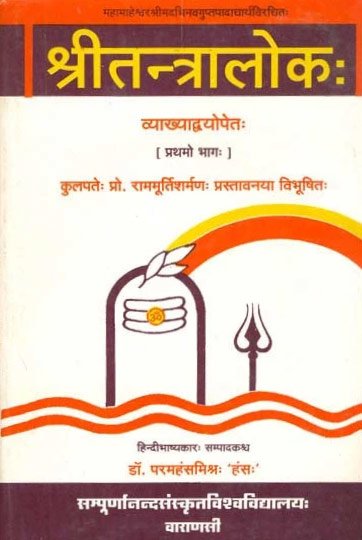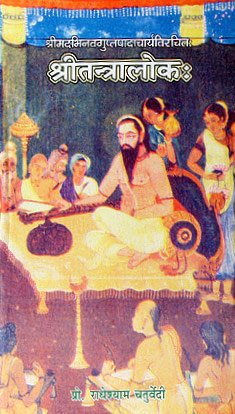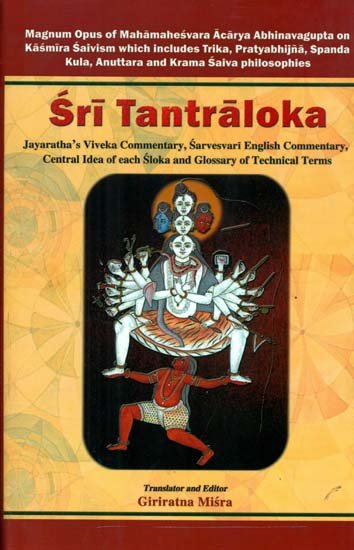Tantraloka [sanskrit text]
by Jun Takashima | 2020 | 46,255 words
The Sanskrit text of the Tantraloka of Abhinavagupta including grammatical analysis, English glossary and comparative print editions. The Tantraloka (“light on Tantra”) was written by Abhinavagupta in the 10th century in Kashmir and represents a major Encyclopedic work in Shaivism dealing with many core aspects and terminology.
Verse 13.129
तं स्वेच्छातः संगिरमाणाः स्तवकाद्याः स्वातन्त्र्यं तत्त्वय्यनपेक्षं कथयेयुः ।
तारतम्यप्रकाशो यस्तीव्रमध्यममन्दताः ॥ १२९ ॥
taṃ svecchātaḥ saṃgiramāṇāḥ stavakādyāḥ svātantryaṃ tattvayyanapekṣaṃ kathayeyuḥ |
tāratamyaprakāśo yastīvramadhyamamandatāḥ || 129 ||
The English translation of Tantraloka Verse 13.129 is contained in the book Sri Tantraloka by Satya Prakash Singh & Swami Maheshvarananda. This book is not available online so in order to read the full text and translation you should buy the book:
Buy now! English translation by Satya Prakash Singh & Swami Maheshvarananda (2015)
Glossary of Sanskrit terms
Note: This extracts Sanskrit terms and links to English definitions from the glossary, based on an experimental segmentation of verse (13.129). Some terms could be superfluous while some might not be mentioned. Click on the word to show English definitions.
Svecchatah, Svecchata, Sangir, Sangira, Stavaka, Svatantrya, Tat, Tad, Yushmad, Anapeksham, Anapeksha, Taratamya, Prakasha, Yah, Tivram, Tivra, Adhi,
Analysis of Sanskrit grammar
Note: this is an experimental feature and only shows the first possible analysis of the Sanskrit text (Tantraloka Verse 13.129). If the system was successful in segmenting the sentence, you will see of which words it is made up of, generally consisting of Nouns, Pronouns, Verbs, Participles and Indeclinables. Click on the link to show all possible derivations of the word.
- Line 1: “taṃ svecchātaḥ saṃgiramāṇāḥ stavakādyāḥ svātantryaṃ tattvayyanapekṣaṃ kathayeyuḥ ”
- tam -
-
ta (noun, masculine)[adverb], [accusative single]ta (noun, neuter)[adverb], [nominative single], [accusative single]tā (noun, feminine)[adverb]tan (noun, masculine)[adverb]sa (noun, masculine)[accusative single]
- svecchātaḥ -
-
svecchātaḥ (indeclinable)[indeclinable]svecchāta (noun, masculine)[nominative single]
- saṅgiram -
-
saṅgira (noun, masculine)[adverb], [accusative single]saṅgira (noun, neuter)[adverb], [nominative single], [accusative single]saṅgirā (noun, feminine)[adverb]saṅgir (noun, feminine)[accusative single]
- āṇā -
-
√aṇ (verb class 1)[perfect active first single], [perfect active second plural], [perfect active third single]√aṇ (verb class 4)[perfect active first single], [perfect active second plural], [perfect active third single]
- aḥ -
-
a (noun, masculine)[nominative single]ṛ (noun, feminine)[vocative single]ṛ (noun, masculine)[vocative single]
- stavakād -
-
stavaka (noun, masculine)[adverb], [ablative single]
- yāḥ -
-
yā (noun, feminine)[nominative plural], [accusative plural]yā (pronoun, feminine)[nominative plural], [accusative plural]
- svātantryam -
-
svātantrya (noun, neuter)[adverb], [nominative single], [accusative single]
- tat -
-
tat (indeclinable correlative)[indeclinable correlative]tad (noun, neuter)[compound], [nominative single], [accusative single]
- tvayya -
-
yuṣmad (pronoun, none)[locative single]
- anapekṣam -
-
anapekṣam (indeclinable)[indeclinable]anapekṣa (noun, masculine)[adverb], [accusative single]anapekṣa (noun, neuter)[adverb], [nominative single], [accusative single]anapekṣā (noun, feminine)[adverb]
- kathayeyuḥ -
-
√kath (verb class 10)[optative active third plural]
- Line 2: “tāratamyaprakāśo yastīvramadhyamamandatāḥ ”
- tāratamya -
-
tāratamya (noun, neuter)[compound], [vocative single]
- prakāśo* -
-
prakāśa (noun, masculine)[nominative single]
- yas -
-
yaḥ (indeclinable relative)[indeclinable relative]ya (noun, masculine)[nominative single]yaḥ (pronoun, masculine)[nominative single]
- tīvram -
-
tīvram (indeclinable)[indeclinable]tīvra (noun, masculine)[adverb], [accusative single]tīvra (noun, neuter)[adverb], [nominative single], [accusative single]tīvrā (noun, feminine)[adverb]
- adhyam -
-
adhī (noun, masculine)[accusative single]
- amandatā -
-
√mand (verb class 1)[imperfect middle third single]
- aḥ -
-
a (noun, masculine)[nominative single]ṛ (noun, feminine)[vocative single]ṛ (noun, masculine)[vocative single]
Other editions:
Also see the following editions of the Sanskrit text or (alternative) English translations of the Tantraloka Verse 13.129
Sri Tantraloka (Set of 8 Volumes)
by Paramahansa Mishra (2000)
[श्री तन्त्रालोकः (संस्कृत एवं हिंदी अनुवाद)] Sanskrit Text with Hindi Translation; Published by Sampurnanand Sanskrit University; With two commentaries: Viveka (विवेक) by Ācārya Śrī Jayaratha and Nīrakṣīraviveka (नीरक्षीरविवेक) by Paramhans Mishra.
Buy now!
Tantraloka of Abhinavagupta (with Jnanavati Hindi commentary)
by Radheshyam Chaturvedi (2002)
[आचार्य अभिनवगुप्त द्वारा रचित तंत्रलोक: संस्कृत एवम् हिन्दी अनुवाद (पाँच खंडों में)] Sanskrit Text with Hindi Translation and Commentary; Published by Chaukhambha Vidya Bhawan.
Buy now!
Sri Tantraloka of Abhinavagupta
by Giriratna Misra (2018)
With Viveka Saṃskṛta Commentary by Rājānaka Jayaratha; Sanskrit Text, Transliteration, Sarveshwari English commentary; With Glossary and Central Idea of Each Śloka; Published by Chaukhamba Surbharati Prakashan
Buy now!![Tantraloka [sanskrit text] - book cover](/uploads/a/Tantraloka-Sanskrit.jpg)


